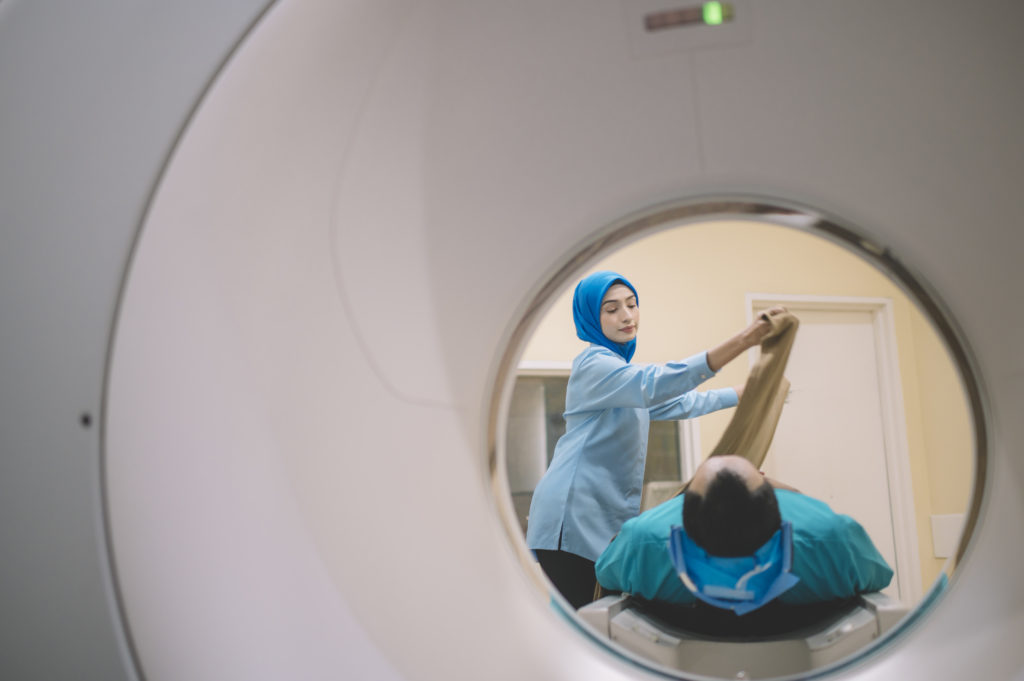In addition to implementing tips shared in an NBTS blog post last month, taking care of the mind and body can help foster strength and resilience to face scanxiety. Treating yourself with tenderness and compassion while managing your energy can make a positive difference. Self-care can look like eating a nutrient-dense diet, getting plenty of rest and sleep, meditation, or exercising.
1. Practice Meditation
Meditation and mindfulness techniques can be helpful tools to implement when you start feeling scanxiety.
“Meditation doesn’t have to be seated on the ground on a cushion in silence,” said Victoria Best, PharmD, BCGP, RPh. “It can be practiced while walking outside, listening to music, or lying on your bed, and it’s important to find things that work for you. The book ‘Modern Mindfulness’ provides a lot of great examples of practices that you can incorporate into your daily life, whether you’re sitting on the subway or in a waiting room.”
Breathing exercises, for example, can help you connect with the present moment and take you out of the past or out of the future. Just breathing in slowly in through the nose and allowing the belly to expand and then breathing out through the mouth can activate the calming mechanisms in your body, putting you at ease. Counting your breaths, drawing attention to your breathing, and observing your breath can ground you in the here and now.
“By being human, you have a mind that wanders — and that’s okay,” Victoria shared. “It’s what minds do. With mindfulness, the practice is in calling yourself back when you notice your mind wandering. So, instead of following thoughts leading to things that terrify you, like the unknown and uncontrollable future or what your scan results might be, mindfulness practices can call you back to the present moment.”
Awareness of when you’re feeling anxious and noticing how your body responds when feeling anxious can be part of mindfulness practice. Recognizing emotions and how they impact you — like noticing how your shoulders rise up to your ears, your stomach aches, your breathing tends to get shallow, etc. — during times of overwhelm helps give you insight into your internal state too.
“One practice that can support folks who are experiencing scanxiety — either before, during, or after a scan — is naming things that are real,” Victoria explained. “Naming things that you can see, hear, touch, taste, and smell can help orient you to where you are in the moment. For example, try to notice really specific things like a particular shade of blue, your dog snoring, the hum of the refrigerator, the feeling of your feet against the ground, or the feeling of the breeze against your skin. Noticing things in the present moment is what mindfulness is in a nutshell. It’s paying attention on purpose to the present moment experience without judgment.”
If you want to partake in meditation designed specifically for patients with brain tumors and their loved ones, you can join the National Brain Tumor Society’s Meditation Mondays. This half-hour session, led by Victoria, is held on the second Monday of each month at 7 p.m. ET/4 p.m. PT. You can also find a variety of free meditation apps, workshops, and classes available online or at your local cancer center.
“By practicing meditation in our day-to-day lives, we develop skills that we can tap into when life gets challenging,” Victoria shared. “Then, when you’re experiencing moments of overwhelm and fear like in the days when you’re awaiting scan results, you can pull skills from your toolkit that work for you and call yourself back to the present moment.”
2. Recite Mantras or Affirming Phrases
You may find comfort in reciting affirmations, mantras, or religious texts. You can recite these phrases mentally during a scan or speak them aloud in other times of heightened scanxiety. If there is a particular phrase that you find empowering, repeat it to yourself over and over, write the phrase in your journal every day, or write it on a note and stick it to your bathroom mirror, computer screen, or bag.
“There are tons of mantras, affirmations, and prayers that you can choose from, and I encourage people to find the words that mean the most to them,” Victoria said. “One I use often is reminding myself repeatedly that ‘I can do hard things.’ Specifically, I remind myself, ‘I survived losing my mom [after a glioblastoma diagnosis]. I can do this too.'”
Other helpful affirmations for scanxiety might include:
- “I am not alone.”
- “I am supported.”
- “I am strong.”
- “I am capable.”
- “The anxiety I feel will pass.”
- “I respect and honor my feelings.”
- “My anxiety doesn’t define me.”
- “I’ve done this before. I can do it again.”
- “I release any doubts and fears.”
“We can’t control what’s going on with our tumor or the outcome of the scan,” said Brett J., who was diagnosed with oligodendroglioma approximately 10 years ago. “What I do have control over is how I take my breath. I had a great therapist who shared this mantra, ‘Brett, are you safe right this moment? Are you OK?’ Well, yes. I might not be in five seconds, but I’m OK right in this moment.’ I just kept repeating that mantra to myself, particularly in the beginning when I was sure that this tumor would evolve, and I would die quickly. Over the years, I have evolved into asking myself, ‘Am I at peace in this moment?’ If I’m not, I ask myself if there is anything I can do about it that is in my control. What will I do with this pent-up energy besides going into a spiral? Go for a walk? Use my elliptical machine? Cook? We all have our meditative things.”
If spirituality or religion is important to you, mantras or texts specific to your beliefs can bring comfort in times of fear and stress.
“When I’m actually in the MRI, I now feel a real sense of release,” Brett said. “I can say that this is out of my hands — whatever they’re going to find. From the beginning, I had a helpful spiritual mentor who suggested I memorize psalms. I memorized psalms that would go through my head in the MRI. It’s become a place that’s kind of like my little monastic retreat. Most people don’t believe that, but it’s really true for me. I go in there and let go.”
3. Move Your Body
According to the CDC, “regular physical activity is one of the most important things you can do for your health.” Movement is an effective way of reducing stress and anxiety and can boost energy and overall health and well-being. Movement can be walking, stretching, riding a bike, yoga, gardening, or any physical activity you enjoy.
“While it’s important to check with your health care team before beginning a new exercise program, physical activity can support people with feelings of fatigue and anxiety, their emotional well-being, and quality of life,” Victoria shared. “Brain tumors and their treatment side effects can impact mobility, balance, and more, but your team can help you find and design safe and accessible activities that work for you. For example, chair yoga or tai chi might be great options for people who enjoy mindful movement. Physical therapists can support people impacted by brain tumors as they explore new ways to move and navigate their daily lives.”
The National Comprehensive Cancer Network (NCCN) Guidelines for Patients on Survivorship Care for Healthy Living (2020) provides general goals for physical activity like avoiding periods of inactivity, strengthening, and stretching.
4. Find Community Support
Tap in to any source of strength that can help refuel your body and mind when you’re feeling depleted from the anxious thoughts ruminating in your mind. For some, this might be a support group, a local community organization, or a religious institution.
“When we connect with others with shared experiences and difficulties, there’s a sense of belonging and common humanity we find,” Victoria said. “We come to realize that other people feel this way too and maybe none of us are alone.”
Speaking your feelings aloud can help offload some of the weight you’re carrying when having these thoughts in isolation. Many different types of support groups are available both in person and online, so you can find one that fits your personal preferences and needs.
“I think joining a support group and talking to people experiencing similar issues can be quite healing,” said Alexa Greenstein, MSN, RN, FNP-C, a neuro-oncology nurse practitioner at Kaiser Permanente. “It’s a wonderful place to learn and share different approaches, strategies, and resources to help work through the emotions that come up with scans. Discussing what one is feeling with others going through similar experiences can provide this level of reassurance, connection, and validation to remind individuals that they’re not alone and lighten the burden of scanxiety.”
NBTS hosts Brain Tumor Support Conversations (BTSC) on the third Sunday of each month at 7 p.m. ET/4 p.m. PT. This online support group is attended and run by patients and care partners who have had firsthand experience with the challenges and effects of a brain tumor diagnosis. It’s a welcoming space where patients and loved ones can have honest, supportive discussions about the feelings and emotions accompanying any aspect of the brain tumor experience.
“After diagnosis at 34 years old, in a medium-sized city in the Midwest, there just aren’t many support options,” Adam Hayden, one of the two BTSC co-facilitators, said. “Add to this my mobility impairments following surgery, and my lifeline to the brain tumor community is and was online. Regardless of a patient or care partner’s location geographically or accessibility concerns, virtual groups offer patients, care partners, and families a way to connect with the community.”
5. Enjoy a Favorite Activity
Distracting yourself and staying busy can be a good way to keep your mind occupied instead of focusing on upcoming scans or scan results. Activities can include reading a good book, enjoying a favorite hobby, spending time out in nature, listening to music, watching a TV show or movie, learning something new, or engaging in a conversation.
Connecting with people and activities you care about can help lift you up, bring you joy, and provide help during difficult times.
“Give yourself permission to enjoy the things you love even during times of great uncertainty and heightened anxiety,” Victoria shared. “Hobbies and activities that are safe and readily available can serve as distractions too. You might make a list of activities that you enjoy and choose one the next time you begin to experience overwhelming emotions.”







